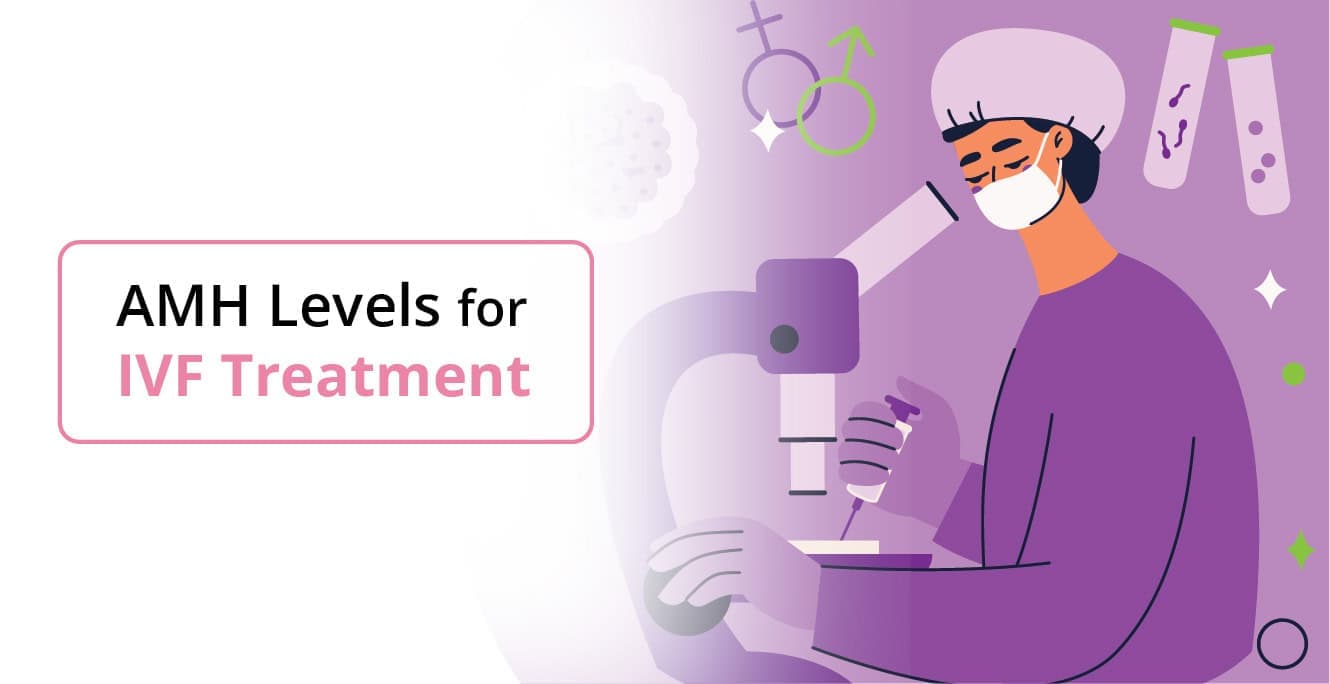Table of Contents
- What is Anti-Mullerian Hormone (AMH)?
- Optimal AMH Levels for Fertility
- Fertility Treatment Options
- The Role of AMH in IVF
- What’s a Good AMH Level for IVF?
- AMH and Egg retrieval
- How Age Affects IVF and AMH
- AMH and IVF Success Rates
- Challenges of Low AMH Levels
- Tips for IVF Success with Low AMH
- Personalized Fertility Plans for Fertility Disorders
- Considerations and Challenges
- Conclusion
- Frequently Asked Questions (FAQs)
One of the most basic human desires is to start a family. Reaching this objective, though, can be difficult for a lot of people and couples, and fertility problems can provide serious challenges. Anti-Müllerian Hormone (AMH) has been a key indicator for determining potential for conception in recent years. We will explore the realm of needed AMH levels, what they mean, and how important they are to fertility treatment in this extensive guide.
What is Anti-Mullerian Hormone (AMH)?
It is crucial to realise what AMH is and how it functions in the human body in order to appreciate the relevance of necessary AMH levels. The small, developing follicles inside the ovaries generate a glycoprotein known as the anti-Mullerian hormone. Its main job is to stop male embryos’ Müllerian ducts from developing, which stops female reproductive organs from developing. The ovarian follicles in females continue to produce AMH throughout their lives, albeit at different rates based on age and other variables.
The blood’s AMH levels can be used to determine a woman’s ovarian reserve, or her prospective ability to become pregnant. Required AMH levels help determine the best course of reproductive treatment and are thought to be ideal for a successful natural pregnancy.
Optimal AMH Levels for Fertility
Although AMH levels might differ greatly between people, there is a range that is usually thought to be ideal for conception. It’s crucial to remember that there are exceptions to the general rule regarding the optimal range of AMH levels for women of reproductive age, which is 1.5 to 4.0 ng/ml. A person’s age and medical history are two personal aspects that influence what is needed for them, as are the slightly varying ranges used by different laboratories and healthcare professionals.
AMH levels can provide important information about a person’s ovarian reserve, and knowing what is needed for maximum fertility can assist in informing treatment choices. What various AMH levels might mean is as follows:
- Low AMH Levels: Reduced ovarian reserve is usually indicated when AMH levels are below the necessary range. Because of this, trying to conceive naturally may become more difficult, and in vitro fertilisation (IVF) or other reproductive treatments may be advised.
- Normal AMH Levels: It’s generally accepted that fertility is best achieved when AMH levels are within the necessary range. Normal AMH levels are typically associated with a healthy ovarian reserve and favourable odds of naturally becoming pregnant.
- High AMH Levels: It can also be difficult to deal with AMH levels that are noticeably higher than normal. Although having a high ovarian reserve may seem beneficial, it can also raise the risk of multiple pregnancies and cause difficulties with reproductive treatments.
Fertility Treatment Options
AMH levels are just one of several variables that affect the decision of reproductive treatment, along with age, underlying infertility causes, and personal preferences. The following list of typical fertility treatments and their associations with AMH levels:
- Natural Conception: Natural conception is still an option for people with normal AMH levels. It might still be difficult, though, if there are other underlying problems with fertility.
- Ovulation Induction: When AMH levels are low, drugs such as clomiphene and letrozole are frequently used to induce ovulation. These medications can increase the likelihood of pregnancy and assist in controlling the menstrual cycle.
- In Vitro Fertilisation (IVF): IVF is a popular fertility procedure used to treat low AMH levels among other infertility problems. It increases the likelihood of becoming pregnant by enabling more control over the quantity of eggs recovered.
- Egg Donation: Using donated eggs can be a good alternative for people with extremely low AMH levels or poor egg quality. This enables people to become pregnant even in cases where their own eggs are unsuitable.
- Surrogacy: This option may be taken into consideration if the lady is unable to become pregnant or if both of the intended parents are experiencing fertility problems. In this case, the intending parents’ surrogate is carrying the pregnancy.
The Role of AMH in IVF
AMH is like a crystal ball that predicts how well you’ll respond to IVF treatment. Here’s why AMH matters during IVF:
- It tells us about your ovarian reserve, which is the number of eggs you have in stock.
- While AMH can’t say anything about the quality of your eggs, it’s still a useful tool for doctors to plan your IVF journey.
What’s a Good AMH Level for IVF?
The ideal AMH level for IVF depends on your age. As you get older, your AMH levels naturally drop. Here’s a rough guide:
|
Age |
Ideal AMH Level |
|
45 years |
0.5 ng/ml |
|
40 years |
1 ng/ml |
|
35 years |
1.5 ng/ml |
|
30 years |
2.5 ng/ml |
|
25 years |
3 ng/ml |
AMH and Egg retrieval
During IVF, doctors aim to collect as many healthy eggs as possible. This is where AMH comes in handy:
- If you have higher AMH levels, you’re likely to have more eggs retrieved during IVF. This means better chances of success and maybe even some extra embryos to freeze for later.
- On the flip side, lower AMH levels often mean fewer eggs and a higher risk of the IVF cycle being cancelled.
How Age Affects IVF and AMH
Age is a big factor in the IVF game. Here’s what you need to know:
- Younger women usually have higher AMH levels and better IVF outcomes. Even if their AMH is on the lower side, they can still have a good shot at success with the right treatment plan.
- For older women, AMH becomes a more important predictor of IVF success. Higher AMH levels in this age group are linked to better pregnancy rates.
AMH and IVF Success Rates
So, how does AMH impact your chances of IVF success? Let’s break it down:
- With a normal AMH level, you’re more likely to respond well to fertility drugs and have a good number of eggs collected. This boosts your odds of a live birth.
- If you have a low AMH level, you might have fewer eggs to work with, but it doesn’t mean IVF is off the table. Especially if you’re under 35, you can still have a reasonable chance of success.
- High AMH levels are generally a good thing for IVF. You’ll probably have more eggs, a lower risk of cycle cancellation, and maybe even some extra embryos to freeze for the future.
Challenges of Low AMH Levels
Low AMH can throw some curveballs into your IVF journey:
- You might have fewer eggs collected, which means fewer embryos to work with.
- There’s a higher risk of the IVF cycle being cancelled if there aren’t enough eggs growing.
- Low AMH can also mean a higher chance of abnormal fertilization and embryo development.
Tips for IVF Success with Low AMH
Here are some tips to boost your chances of IVF success, even with low AMH:
- Start early: The younger you are when you do IVF, the better your odds. Egg freezing when you’re younger and your AMH is higher can be a smart move for the future.
- Personalize your treatment: Work with your doctor to create a customized plan based on your unique situation. If your AMH is really low, using donor eggs might be an option to consider.
- Live healthy: While the jury’s still out on whether lifestyle changes can directly impact AMH, a balanced diet and regular exercise are always a good idea for overall health.
- Find a specialist: Look for a fertility doctor with experience dealing with low AMH cases who can offer tailored advice. Doctors can tailor your fertility drug protocol to help you grow more eggs.
Personalized Fertility Plans for Fertility Disorders
Creating individualised treatment programmes is a critical component of resolving reproductive issues. Because achieving fertility is such a personal experience, what works for one person might not work for another. To establish a customised approach, healthcare providers need to consider the patient’s age, AMH levels, medical history, and any other underlying disorders.
It is important to remember that each person may require a different level of AMH in order to have a successful reproductive treatment. An ideal treatment strategy will take into account all relevant factors, including qualitative and quantitative elements (e.g., egg quality and overall health of the individual) as well as quantitative measurements (e.g., AMH levels).
Considerations and Challenges
Although AMH levels provide useful information, there are issues and difficulties when utilising them as the only fertility indicator:
- Egg Quality: AMH levels tell us how many eggs there are, but not how good they are. If egg quality is damaged, people may still have trouble getting pregnant even with the necessary amounts of AMH.
- Other Factors: A person’s lifestyle, general health, and underlying medical disorders are some of the factors that can affect fertility. AMH levels are merely a single component of the whole.
- Emotional and Psychological Effects: Becoming a parent can be an emotionally taxing experience. Stress and emotional strain may increase as a result of fertility therapies and worries about AMH levels.
- Age Considerations: Although the necessary AMH levels for a healthy pregnancy may be achievable, they may decline with age. Age is a major factor in fertility. Seeking fertility treatment on time is crucial.
Conclusion
Understanding the necessary AMH levels is a crucial part of fertility screening and fertility treatment when trying to start a baby. Although having ideal AMH levels might give important information about a person’s ovarian reserve and likelihood of conceiving naturally, it’s important to keep in mind that fertility is the result of a complicated interplay of many different factors.
Effective treatment of reproductive issues requires individualised treatment programmes directed by experts who take the full medical situation into account. Individuals and couples can traverse the challenges of infertility and move towards realising their dream of parenthood with the help of breakthroughs in fertility treatments and support. If you are planning for IVF treatment and want to learn more about AMH levels, give us a call today to meet our expert. Or, you can fill in the details in the give appointment form and our coordinator will call you back shortly.
Frequently Asked Questions (FAQs)
- How does AMH level affect IVF treatment?
It is stated that AMH <1.0 ng/mL shows limited egg supply and restricts the fertility window and opportunity to conceive a baby. AMH >1.0 ng/mL states you may respond well to IVF stimulation drugs and have better chances of conception. AMH >3.5 indicates that you have a sufficient egg supply and should be cautious to avoid the risk of OHSS.
- Does a low AMH level mean infertility?
Not really. If you are experiencing regular menstrual cycles then it means that you will ovulate one egg per month which increases the chances of pregnancy and the natural fertilization process.
- Why AMH test is recommended in IVF treatment?
It is typically recommended to check the ovarian reserve before initiating IVF treatment in order to determine the doses of fertility drugs for ovulation induction. However, this test does not really disclose anything regarding the quality of the eggs.
Our Fertility Specialists
Related Blogs
To know more
Birla Fertility & IVF aims at transforming the future of fertility globally, through outstanding clinical outcomes, research, innovation and compassionate care.
Had an IVF Failure?
Talk to our fertility experts

 Our Centers
Our Centers















